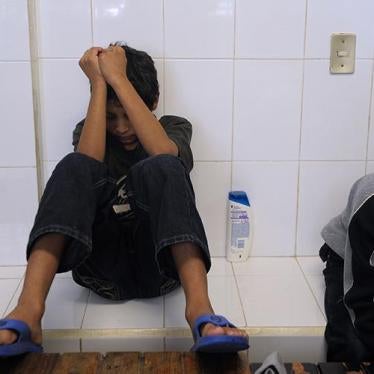This submission focuses on the topic of girls’ rights to access safe abortion and the protection of students, teachers, and schools during time of armed conflict. It proposes issues and questions that Committee members may wish to raise with the government.
Access to Abortion (Articles 2, 6, 14, 16, 24, 37)
El Salvador is one of six countries in Latin American and the Caribbean with a total ban on abortion in all circumstances, meaning that abortion is criminalized even when the life or health of the pregnant woman or girl is in danger, when the pregnancy resulted from rape or incest, or when the fetus will not survive outside the womb.
Human Rights Watch is deeply concerned about the impacts of the criminalization of abortion on adolescent girls in El Salvador. Under restrictive criminal laws, girls facing unplanned, unwanted, or crisis pregnancies are forced to risk their health and lives, and possible criminal prosecution, to seek clandestine abortions, or continue with unwanted pregnancies against their wishes.
Under the criminal code, women and girls who have abortions, and the medical providers who assist them, can face severe prison sentences. Salvadoran authorities have harshly punished some women who have suffered stillbirths or miscarriages or other obstetric emergencies in the later stages of their pregnancies, charging them with aggravated homicide and sentencing them to 30 years or more in prison.
In his November 2017 statement to El Salvador, the United Nations High Commissioner for Human Rights, Zeid Ra’ad al-Hussein, recommended to President Sánchez Cerén that El Salvador “should comply with its international human rights obligations and lift the absolute prohibition on abortion.”[i]
In late April, however, El Salvador’s Legislative Assembly did not consider proposals to ease the total abortion ban. Human Rights Watch was disappointed that Salvadoran authorities failed to decriminalize abortion in the last legislative cycle, and the country continues to operate with a criminal code that violates women’s human rights and contributes to public health crises.
Human Rights Watch recommends that the Committee ask El Salvador to:
- Provide data on abortion-related morbidity and mortality among women and girls, including deaths from induced abortion, and hospitalizations for abortion-related complications; as well as data on arrests and prosecutions for abortion-related charges, and the details of those cases;
- Provide data or information from public health officials about maternal deaths or morbidity resulting from the denial of abortion services to women or girls whose life or health were endangered, and the details of those cases;
- Pardon and release all women who remain in prison for abortion-related offenses or for obstetric emergencies that led to fetal or infant death;
- Decriminalize abortion in all circumstances and take all necessary steps, both immediate and incremental, to ensure that girls have informed and free access to safe and legal abortion services, and post-abortion care, as an element of the exercise of their reproductive and other human rights.
Protecting Students, Teachers, and Schools During Armed Conflict (Articles 28, 38, 39)
In November 2017, El Salvador became the 71st country to endorse the Safe Schools Declaration and thereby commit to using the Guidelines for Protecting Schools and Universities from Military Use during Armed Conflict as a practical tool to guide their behavior during military operations.
Human Rights Watch recommends that the Committee:
- Commend El Salvador for its endorsement of the Safe Schools Declaration and the Guidelines for Protecting Schools and Universities from Military Use during Armed Conflict;
- Encourage El Salvador to continue to develop and share examples of its implementation of the Declaration’s commitments with other countries that have endorsed the Safe Schools Declaration and with the Committee as examples of good practice in protecting students, teachers, and schools during armed conflict.
[i] UNHCR, “Statement by UN High Commissioner for Human Rights Zeid Ra’ad Al Hussein at the end of his mission to El Salvador,” November 2017, https://www.ohchr.org/en/NewsEvents/Pages/DisplayNews.aspx?NewsID=22412&LangID=E (accessed June 29, 2018).






